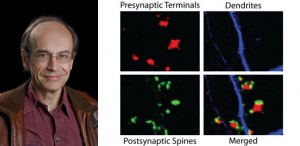
MBF customer Dr. Thomas Südhof wins Nobel Prize
The Nobel Prize in Physiology or Medicine was awarded to Drs. Thomas Südhof, James Rothman, and Randy Schekman for discovering the principles of how molecules are transported within cells and in between cells and how they are delivered to the right place at the right time. Disruptions in this precise system are implicated in numerous neurological and immunological disorders.
Dr. Sudhof uncovered how neurotransmitters are released into a synaptic cleft precisely when they need to be. His research explained the molecular machinery that responds to an influx of calcium and signals the release of neurotransmitters.
At Stanford, he and his lab are interested in how neurons communicate and are working towards a complete understanding of how a synapse releases neurotransmitters. This knowledge would provide insight into neurodegenerative diseases such as Alzheimer’s and Parkinsons.
Dr. Südhof used Neurolucida in a recent paper published in Neuron that explored two mutations of Neuroligin-3, a protein involved in building and maintaining synapses. The protein mutations are exhibited in some individuals with autism. He and his colleagues discovered that Neuroligin-3 mutations associated with autism impair endocannabinoid signaling. Endocannabinoids are molecules that are critical regulators of normal neuronal activity and are involved in learning, pain, and other important processes. This finding opens up a new area of research, as endocannabinoid signaling was not considered to be a factor in autism.
The full paper can be found here: Autism-Associated Neuroligin-3 Mutations Commonly Disrupt Tonic Endocannabinoid Signaling Csaba Földy, Robert C. Malenka, Thomas C. Südhof Neuron – 8 May 2013 (Vol. 78, Issue 3, pp. 498-509)
Photo courtesy: Sudhof Lab



